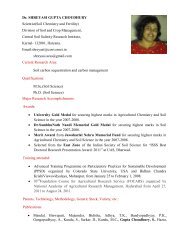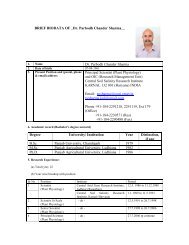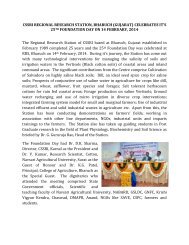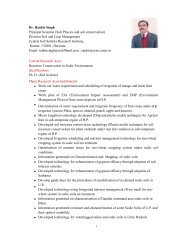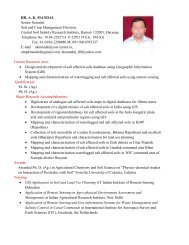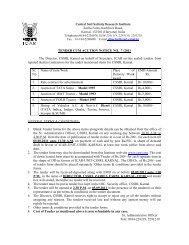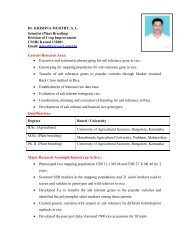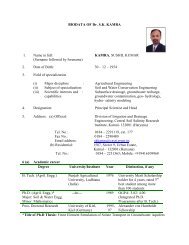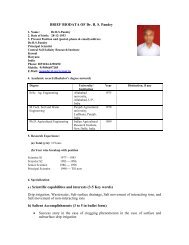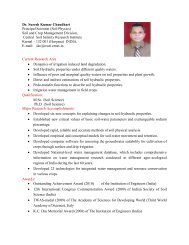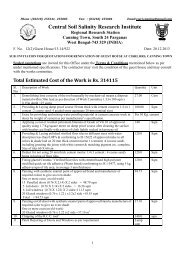Salinity News - CSSRI Karnal
Salinity News - CSSRI Karnal
Salinity News - CSSRI Karnal
Create successful ePaper yourself
Turn your PDF publications into a flip-book with our unique Google optimized e-Paper software.
SALINITY <strong>News</strong><br />
Vol. 16, No. 2 July-December, 2010<br />
July under dry condition with a seed rate of 125 kg/ha. Pre emergence<br />
weedicide pendamethalene @1000 g a.i /ha within 3 days after sowing<br />
(DAS) is also applied. In upland fi elds, seasonal weeds may be noticed<br />
after 20 DAS even after application of pre-.emergence weedicide. Further,<br />
Almix (4g a.i. /ha) can be applied at 25 DAS. Recommended dose of 100:<br />
60: 40 kg NPK/ha was applied to the crop. Three to four irrigations may<br />
be applied in DSR.<br />
In a fi eld experiment conducted at Lucknow, crop yields under DSR was<br />
at par (4.2t/ha) with the traditional method. In DSR, substantial amount<br />
of reduction in irrigation water (250- 425 mm/ha) was recorded. Adoption<br />
of DSR also saved the time and labourer to sow the crop. Besides, 12-15<br />
days advance maturity was observed in DSR which helped in timely sowing<br />
of wheat. Although extra expenditure of Rs 850 was incurred to control the<br />
weed in DSR, there was substantial reduction in cost of laborers, irrigation<br />
water and puddling. In terms of net saving, Rs1900-2300/ha was recorded<br />
under DSR over TPR.<br />
V.K.Mishra, D.K.Sharma and C.L.Verma<br />
41 st Foundation day of the Institute was celebrated on August 18, 2010.<br />
Dr. B. Mishra, Vice-Chancellor, Sher-e-Kashmir University of Agricultural<br />
Sciences and Technology, Jammu was the Chief Guest. He emphasized<br />
that the scientists should conduct the research to sustain the socioeconomic<br />
conditions of the farmers and to conserve natural resources<br />
for getting higher productivity of crops. He also apprised the house that<br />
this institute has evolved the number of salt resistant varieties of rice,<br />
Celebration of Foundation Day<br />
wheat and mustard. Variety CSR 30 of rice developed by this institute<br />
has made a signifi cant contribution to improve the economic status of<br />
the farming community. Dr. Mishra delivered a foundation day lecture<br />
on Advances in Rice and Wheat Research for food and Nutritional<br />
Security. He also shared his experiences in converting saline soil into<br />
fertile land of this institute. He stressed that the farmers should use<br />
organic manure for getting higher and quality produce.<br />
Research Advisory Committee Meeting<br />
The fi rst meeting of the newly constituted Research Advisory Committee<br />
(RAC) of the Institute was held under the chairmanship of Dr. Pratap<br />
Narain at <strong>CSSRI</strong>, <strong>Karnal</strong> from October 22-23, 2010. The other members<br />
who attended the meeting included Dr. T.N. Chaudhary, Dr. P.K. Joshi,<br />
Dr. K.V.G.K. Rao, Dr. P.S. Pathak, Dr. D.K. Sharma, Sh. M.S. Mehla<br />
(Progressive farmer) and Dr. P. Dey. Dr. S.K. Gupta, PC (SSW),<br />
Dr. S.K. Sharma, HDCI, Dr. J.C. Dagar, HDSCM, Dr. S.K. Kamra, HDIDE<br />
and Dr. R.S. Tripathi, HDTET were also present.<br />
Dr. D.K.Sharma, Director welcomed the Chairman and the members of the<br />
committee and presented the progress report of the Institute. After reviewing<br />
the Action Taken Report, a discussion was held with all the Heads of the<br />
Divisions. Following important researchable issues were crystallized.<br />
• Mapping and characterization of salt affected soils should aim towards<br />
identifi cation of researchable issues and setting up of priorities and<br />
change detection in spatial context.<br />
• Guidelines should be established for management of salt affected<br />
soils in eco-regional context and for allocating resources for research<br />
and development<br />
• Multi-enterprise model studies should be focused on major enterprises<br />
in the context of agro-social conditions.<br />
• Monitoring and evaluation of reclamation technologies needs to be<br />
carried out in time phases<br />
• Research should focus on development of technologies for ground<br />
•<br />
•<br />
water recharge under saline environment and for transfer of<br />
technologies to state agencies for large scale adoption.<br />
Drainage research particularly with respect to sub-surface drainage<br />
should be included in core area, keeping in view the drainage<br />
requirement of various states including Maharashtra, Haryana and<br />
Punjab.<br />
Water management particularly with respect to poor quality waters<br />
(saline water, sewerage and industrial effl uents) needs strengthening.<br />
Bioremediation and Phyto-remediation measures for managing poor<br />
quality water are to be developed.<br />
4




